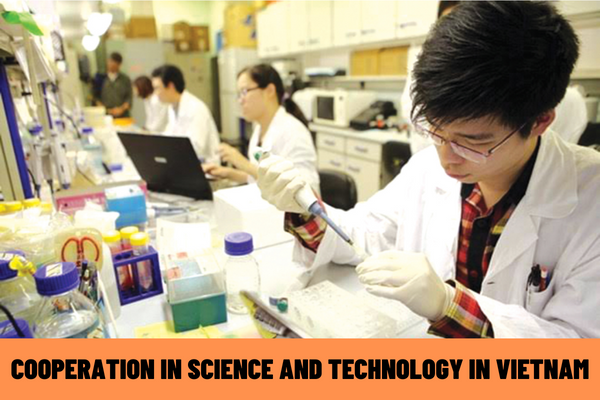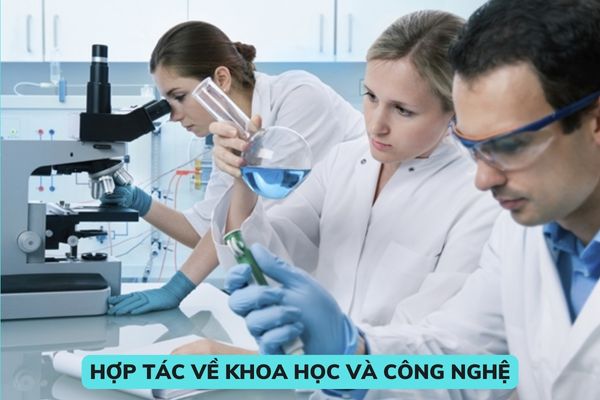In what cases can higher education institutions and enterprises outside higher education institutions cooperate in science and technology in Vietnam?
- In what cases can higher education institutions and enterprises outside higher education institutions cooperate in science and technology in Vietnam?
- What is included in the startup and innovation ecosystem in higher education institutions in Vietnam?
- Policies on international cooperation in science and technology in higher education institutions from March 1, 2023?
In what cases can higher education institutions and enterprises outside higher education institutions cooperate in science and technology in Vietnam?
In Article 16 of Decree No. 109/2022/ND-CP, cases of cooperation in science and technology between higher education institutions and enterprises outside higher education institutions include:
- Higher education institutions proactively explore the needs of enterprises for technological innovation and product innovation in related fields, connect and cooperate in research to solve enterprises' needs, negotiate and sign cooperation documents with enterprises.
- Public higher education institutions may cooperate with enterprises to invest in the construction of joint research laboratories, small and medium-sized business incubators, technical facilities to support small and medium-sized enterprises, and co-working areas at a higher education institution in accordance with the law on management and use of public property, public investment and relevant regulations; participate in the signing of contracts for consultancy, appraisal and technology assessment for enterprises' new projects of production, technology import or innovation as agreed.
- Higher education institutions may receive financial support or equipment from enterprises for scientific, technological and exploitation activities as agreed with enterprises in accordance with the law on funding and aids.
- Higher education institutions may contribute capital with intellectual property to enter into joint ventures and associations with enterprises outside higher education institutions in accordance with the law on intellectual property, the law on management, use of public property and receive profits from joint venture and association activities according to regulations. Enterprises may receive a share of intellectual property rights when receiving technology transfer from higher education institutions in accordance with the provisions of the law on intellectual property and the law on technology transfer.
- Higher education institutions shall, based on regulations on scientific research of lecturers, calculate research hours for lecturers participating in scientific and technological activities at enterprises that cooperate with higher education institutions.
- Enterprises may use their science and technology development funds:
+ To pay wages or hire experts who are lecturers and students of higher education institutions to carry out scientific and technological activities of the enterprise;
+ To spend on scientific and technological research cooperation with higher education institutions in order to solve specific scientific problems in the fields of science and technology that are prioritized by the State or according to fields science and technology in clusters, chains of products that bring competitive advantages to enterprises;
+ To spend on performing general research tasks or scientific research and transferring technology orders to higher education institutions; to spend on training and retraining of human resources in science and technology for enterprises at higher education institutions through short-term, long-term forms, internships and working.
Note: The use of the enterprise's science and technology development fund for the implementation of the above matters must comply with the regulations on management and operation of the fund, the provisions of the law on science and technology, and other relevant regulations.
- Enterprises may invest in building joint research laboratories, small and medium-sized business incubators, technical facilities to support small and medium-sized enterprises, and co-working areas at higher education institutions to cooperate in research and improvement, technology development, application and trial production of new products in order to develop the enterprise's technology in accordance with the regulations on management and operation of the enterprise's science and technology development fund industry, regulations of law on science and technology and other relevant regulations.
- Encourage qualified technical and managerial staff of the enterprise to participate in scientific, technological activities, to train and teach specialized subjects and professional skills, to supervise research, practice at higher education institutions; encourage lecturers of higher education institutions to participate in scientific and technological activities at enterprises.

In what cases can higher education institutions and enterprises outside higher education institutions cooperate in science and technology in Vietnam? (Image from the Internet)
What is included in the startup and innovation ecosystem in higher education institutions in Vietnam?
In Article 17 of Decree No. 109/2022/ND-CP, the startup and innovation ecosystem in higher education institutions in Vietnam includes:
- Higher education institutions promulgate regulations on supporting startups and innovation for lecturers and students, developing and forming a culture of startups and innovation in higher education institutions.
- Higher education institutions form and develop innovation centers, start-up and innovation networks of their own, and coordinate with other higher education institutions to develop start-up and innovation network.
- Higher education institutions shall develop incubation programs and training programs on startups and innovation for lecturers and students; form and develop startups and innovation from start-up ideas, innovation and research results of lecturers and students.
- Higher education institutions support the establishment of enterprises and registration of science and technology enterprises to commercialize intellectual property rights protected by the State in order to develop the market and mobilize capital from the market, access to state preferential capital sources for science and technology enterprises.
- Higher education institutions possessing patents and utility solutions that have been protected by the State may establish enterprises, register science and technology enterprises in order to exploit, improve and commercialize products according to regulations; may promulgate regulations and implement regulations on transfer of science and technology enterprises to organizations and individuals outside higher education institutions in order to have financial resources to reinvest in research activities and enhance science and technology potential for higher education institutions in accordance with the law on science and technology, the law on intellectual property, the law on management and use of state capital invested in production, doing business at enterprises, the law on management and use of public property and other relevant laws.
- Higher education institutions may associate with organizations and individuals to establish science and technology development funds of higher education institutions according to regulations in order to form and develop innovation centers, small and medium-sized business incubators, technical facilities to support small and medium-sized enterprises, co-working areas; to develop start-up, innovation network, network of experts, mentors, consultants to support training courses, training, business promotion organizations, venture capital support funds; connect with the national innovation start-up network according to regulations.
Policies on international cooperation in science and technology in higher education institutions from March 1, 2023?
In Article 18 of Decree No. 109/2022/ND-CP, policies on international cooperation in science and technology in higher education institutions from March 1, 2023 include:
- Encourage higher education institutions to promote cooperation with foreign organizations and individuals in science and technology in accordance with agreements on cooperation in science and technology between the Government of Vietnam and the Government of foreign countries or a cooperation agreement between a higher education institution and a foreign organization or individual in accordance with law.
- The higher education institution selects a reputable and experienced foreign partner for cooperation in research and implementation of scientific, technological and innovative activities, and is solely responsible for the content and scope of cooperation, ensuring political security and national secrets; invite or hire foreign experts to participate in high-level research and training; partially support scholarships for lecturers and learners, training, academic exchange abroad, or support remuneration for foreign experts from the scientific and technological development fund of the higher education institution.
- The higher education institution may cooperate in building laboratories between the educational institution and foreign partners in association with the implementation of international cooperation programs and projects on scientific research and technological development as prescribed.
- Higher education institutions promote international cooperation in scientific publication in prestigious scientific journals; promote the quality of scientific journals of higher educational institutions to achieve regional and world standards; chair or participate in holding international scientific conferences and seminars in a number of strong fields and invite foreign scientists to co-chair; organize a professional and reputable international review network, publish yearbooks and other scientific publications according to international standards.
- Higher education institutions may invite experts and sign contracts with reputable scientists and foreign researchers to cooperate, work and carry out scientific research and doctoral training at the institutions; send staff, lecturers, postgraduate students, strong research team members abroad to study and research.
- Higher education institutions may use funds for performing scientific and technological tasks to sign professional contracts with foreign experts; receive financial support or equipment from foreign partners for scientific and technological activities and use them according to agreements with partners as prescribed.
- Higher education institutions enable and together with officials and lecturers to sign professional contracts and join research groups of foreign science and technology organizations; be responsible for the appointment and management of officials and lecturers participating in cooperation and research activities with foreign countries according to regulations.
Decree No. 109/2022/ND-CP takes effect from March 1, 2023.
LawNet
